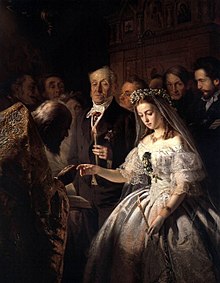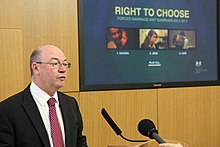
Back زواج بالإكراه Arabic Məcburi evlilik Azerbaijani জোরপূর্বক বিবাহ Bengali/Bangla Dimeziñ dre heg Breton Zwangsheirat German Devigita geedzeco Esperanto Matrimonio forzado Spanish Derrigorrezko ezkontza Basque ازدواج اجباری Persian Pakkoavioliitto Finnish
| Part of a series on |
| Violence against women |
|---|
| Killing |
| Sexual assault and rape |
| Disfigurement |
| Other issues |
|
| International legal framework |
| Related topics |



| Family law |
|---|
| Family |
Forced marriage is a marriage in which one or more of the parties is married without their consent or against their will. A marriage can also become a forced marriage even if both parties enter with full consent if one or both are later forced to stay in the marriage against their will.[1]
A forced marriage differs from an arranged marriage, in which both parties presumably consent to the assistance of their parents or a third party such as a matchmaker in finding and choosing a spouse. There is often a continuum of coercion used to compel a marriage, ranging from outright physical violence to subtle psychological pressure.[2]
Though now widely condemned by international opinion, forced marriages still take place in various cultures across the world, particularly in parts of South Asia and Africa. Some scholars object to use of the term "forced marriage" because it invokes the consensual legitimating language of marriage (such as husband/wife) for an experience that is precisely the opposite.[3] A variety of alternative terms have been proposed, including "forced conjugal association" and "conjugal slavery".[4][5]
The United Nations views forced marriage as a form of human rights abuse, since it violates the principle of the freedom and autonomy of individuals. The Universal Declaration of Human Rights states that a person's right to choose a spouse and enter freely into marriage is central to their life and dignity, and their equality as a human being.[6] The Roman Catholic Church deems forced marriage grounds for granting an annulment—for a marriage to be valid both parties must give their consent freely. The Supplementary Convention on the Abolition of Slavery also prohibits marriage without right to refusal by both parties[7] and requires a minimum age for marriage to prevent this.[8] Similarly, the International Labour Organization recognizes forced marriage as a form of modern slavery.[9]
In 2009, the Special Court for Sierra Leone's (SCSL) Appeals Chamber found the abduction and confinement of women for "forced marriage" in war to be a new crime against humanity (AFRC decision).[10][11] The SCSL Trial Chamber in the Charles Taylor decision found that the term 'forced marriage' should be avoided and rather described the practice in war as 'conjugal slavery' (2012).[12]
In 2013, the first United Nations Human Rights Council resolution against child, early, and forced marriages was adopted; the resolution recognizes child, early, and forced marriage as involving violations of human rights which "prevents individuals from living their lives free from all forms of violence and that has adverse consequences on the enjoyment of human rights, such as the right to education, [and] the right to the highest attainable standard of health including sexual and reproductive health", and also states that "the elimination of child, early and forced marriage should be considered in the discussion of the post-2015 development agenda."[13][14][15] The elimination of this harmful practice is one of the targets of the United Nations Sustainable Development Goal 5.[16]
- ^ "Arranged/Forced Marriage". Unchained At Last. Retrieved 6 October 2022.
- ^ Sharp, Nicola. "Forced Marriage in the UK: A scoping study on the experience of women from Middle Eastern and North East African Communities" (PDF). Refuge. London: 6, 10. Archived (PDF) from the original on 10 August 2017.
- ^ Bunting, Annie. "'Forced Marriage' in Conflict Situations: Researching and Prosecuting Old Harms and New Crimes". Canadian Journal of Human Rights: 179.
... the term marriage should be avoided because the crime in Sierra Leone was 'one of sexual slavery, poorly veiled by the euphemism marriage.'
- ^ Jenni Millbank (7 February 2011). "Forced Marriage and the Exoticization of Gendered Harms in United States Asylum Law". Columbia Journal of Gender and Law. SSRN 1757283.
- ^ Dauvergne, Catherine (2 March 2010). "Forced Marriage as a Harm in Domestic and International Law". Modern Law Review. 73: 57–88. doi:10.1111/j.1468-2230.2009.00784.x. hdl:10453/10487. S2CID 143663015. SSRN 1563842.
- ^ "Ethics – Forced Marriages: Introduction". BBC. 1 January 1970. Archived from the original on 3 September 2015. Retrieved 29 September 2015.
- ^ Supplementary Convention on the Abolition of Slavery, Article 1, (c)
- ^ Supplementary Convention on the Abolition of Slavery, Article 2
- ^ "Global Estimates of Modern Slavery" (PDF). International Labour Organization and Walk Free Foundation. 2017.
- ^ Michael P. Scharf (19 October 2005). "Forced Marriage: Exploring the Viability of the Special Court for Sierra Leone's New Crime Against Humanity". African Perspectives on International Criminal Justice. SSRN 824291.
- ^ Valerie Oosterveld. "IntLawGrrls". intlawgrrls.com. Archived from the original on 6 April 2013. Retrieved 30 January 2013.
- ^ Micaela Frulli (31 October 2008). "Advancing International Criminal Law: The Special Court for Sierra Leone Recognizes Forced Marriage as a 'New' Crime Against Humanity". Journal of International Criminal Justice. SSRN 2014731.
- ^ Stuart, Hunter (16 October 2013). "Country With The Most Child Brides Won't Agree To End Forced Child Marriage". Huffington Post. Archived from the original on 26 October 2013. Retrieved 28 October 2013.
- ^ "UN Takes Major Action to End Child Marriage". Center for Reproductive Rights. 19 August 2013. Archived from the original on 23 December 2014. Retrieved 28 October 2013.
- ^ Girls Not Brides (27 September 2013). "States adopt first-ever resolution on child, early and forced marriage at Human Rights Council". Girls Not Brides. Archived from the original on 29 October 2013. Retrieved 28 October 2013.
- ^ "Sustainable Development Goal 5: Gender equality". UN Women. Retrieved 23 September 2020.
© MMXXIII Rich X Search. We shall prevail. All rights reserved. Rich X Search